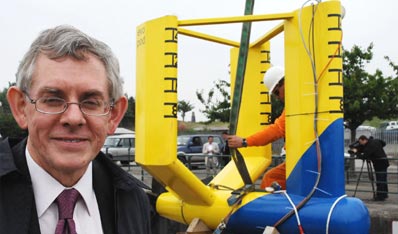
Tidal power trials
Jun 9, 2007 - The Journal

Tidal power pioneers in the North-East yesterday
set out their stall in the "green" battle with wind
farms.
Inventors such as former Swan Hunter naval
architect Graham Mackie and his Evopod are bidding
for a slice of a £50m Government fund to develop electricity
from the ebb and flow of the tide. While battles have
raged over the building of wind farms in the region,
using tidal and wave power has lagged behind. But
that changed yesterday when the only independent large-scale
tidal testing facility in Europe went into operation.
The facility, opened by the North-East's New and Renewable
Energy Centre (NaREC), based at Blyth, Northumberland,
will test prototypes developed to harness the power
of the tides - and try to turn them into a commercial
reality. Story continues Continue story ADVERTISEMENT
In front of more than 70 industry experts, Mr Mackie's
scale model - the real thing will be 25 metres long
- was first into the water at the Tees Barrage in
Stockton. Tidal energy is widely regarded as one of
the best sources of renewable power on offer in the
UK for future generations. Director of policy and
research at independent charity Renewable Energy Foundation
Dr John Constable said: "A new tidal testing centre
is a very positive step. "We are beginning to see
sanity dawning in the world of renewable energy."
Mr Mackie, who lives in Tynemouth, said 3,000 of the
full-scale machines would match the generating capacity
of between three and five nuclear power stations -
sufficient power for between two and a half million
and four million homes. Three square miles of sea
space would take 300 Evopods and have the same capacity
as a typical gas-fired power station. The test facility
was also greeted with enthusiasm by anti-wind farm
campaigners in the North-East. Northumberland farmer
Andrew Joicey, a member of Save Our Unspoilt Landscape
(Soul) group, said: "It's very pleasing to hear we
are now getting to the stage of properly testing the
tidal resource. "Harnessing the power of the tides
is going to be far more significant in contributing
resources than the power of the wind." The technical
problems and cost of trials and operating in the sea
has meant tidal technology has often been rejected
in favour of the easier option of installing wind
turbines. But experts insist it is a far more reliable
resource. Tides can be predicted very accurately years
in advance and the technology has very little visual
impact. Bosses at (NaREC) also insist having a testing
facility in the region will enable local business
to accelerate their growth ahead of competitors. The
region already has a large wave-testing operation
in Blyth, Northumberland, but this new development
will enable companies the opportunity to demonstrate
and launch larger devices in open water. While Government
subsidies for developers of tidal technology has now
increased, experts believe it will be about five years
before a large-scale resource could be a reality.
During that time, scores of wind farms could be built
across the North-East. Experts say there is still
a role for wind technology - although preferably as
part of off-shore farms. Dr Constable added: "Wind
energy does have a role, but things have been done
back to front. Tidal technology is overwhelmingly
superior. While we are at least five years off utilising
it large-scale for commercial means it is set to become
highly valuable." He added: "There are many places
around the country which are looking to tidal power.
The North-East has a tradition of excellence and innovation
in engineering and there is every reason to believe
that can now be turned towards tidal technology."

|